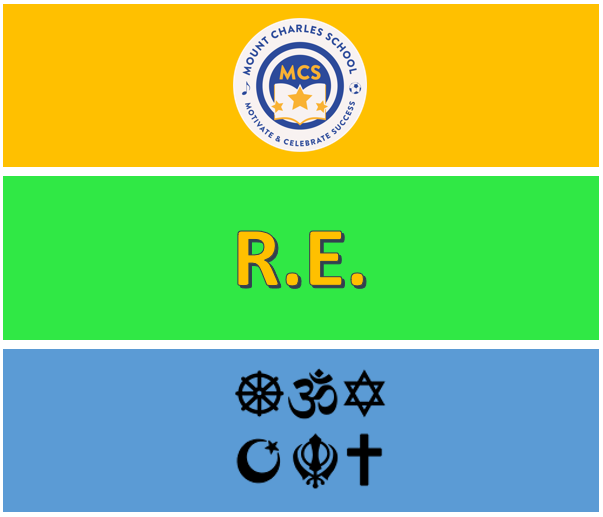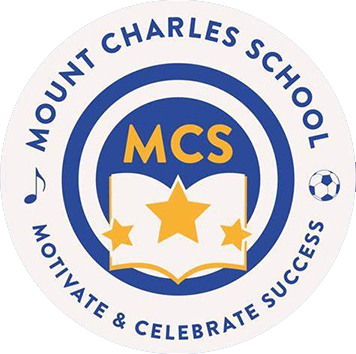 Proud to be a part of Cornwall Education Learning Trust
Proud to be a part of Cornwall Education Learning Trust

RE

Parents have the right to withdraw their child from all or part of RE studies. Please email enquiries@mcs.celtrust.org to make an appointment with a member of our team to discuss this.
INTENT
At Mount Charles, we provide an RE curriculum which excites, promotes and sustains pupils’ interests in their own and others’ beliefs and fosters a natural curiosity and thirst for learning. We know that our pupils live in a context in which there is a lack of diversity of different cultural and religious heritages and we believe that it is our responsibility to widen and broaden pupils knowledge, understanding and experiences of different cultural and religious heritages and beliefs systems through our Religious Education curriculum and wider curriculum. We believe that, through our RE and wider Personal Development offer, it is our responsibility to teach our pupils to be members of modern Britain who understand and respect those with beliefs different to their own.
As a result, during their time with us, pupils learn how to respect themselves and others including opportunities to reflect on and understand their own and others’ beliefs; the reasons for these; and how these change the way they think and act. We also educate pupils in how to relate to others with different beliefs from their own with kindness and understanding. We intend that our Religious Studies Curriculum will help pupils to understand and empathise with the belief of others without judgement or censure.
As part of our Religious Education and wider Personal Development Curriculum pupils explore democracy and the importance of becoming an active citizen and making a positive contribution to the school and how this can form a part of religious belief as well as being important for people of no religious belief. Through our Curriculum our aspiration is that pupils learn about their local community and the wider world and understand their place within them, as well as learning and understanding the value of differing beliefs and ways of life as equally valid and important.
IMPLEMENTATION
At Mount Charles School, we have adopted the Discovery RE program of learning to deliver our RE curriculum from EYFS to Year 6. This enquiry-based programme excites and engages pupils, develops critical thinking skills, deepens knowledge and understanding and allows them to empathise with people, their beliefs and religions. We intend to educate our pupils, so they are equipped to make their own choices and decisions regarding religion and belief. Discovery RE’s enquiry based curriculum design and principal teachings are aligned with the recommended teaching and learning approach of the Cornwall agreed Syllabus 2020-2025.
RE is planned and taught to encourage pupils to ask questions and discover through finding answers. Each half termly unit starts with a ‘Big Question’, such as ‘Is the Christmas story true?’ and ‘Is it good to fast on special occasions?’ Subsequently, each unit guides pupils through an enquiry-based learning approach.
Lessons are taught using Discovery RE’s four step process. These are:
- Step 1 - Engagement: the pupils’ own lived experiences are explored and act as a bridge from their world (which may or may not include religion) into the world of the religion being studied.
- Step 2 - Investigation: over approximately 3 lessons the teacher will guide the pupils to explore and investigate appropriate subject knowledge relevant to the question of enquiry.
- Step 3 - Evaluation: An assessment activity enables pupils to show their thinking and the depth of critical evaluation.
- Step 4 - Expression: This refers pupils back to the starting point of their own experience and allows them to reflect on whether their findings have influenced their own thinking.
Pupils’ knowledge and skills are revisited continually throughout key stage one and two. By teaching in this way, skills and knowledge are built upon progressively. Pupils make progress in incremental steps and have numerous opportunities to consolidate skills and knowledge they have previously acquired. Each year pupils are taught three Christianity units and three further units on a second world religion. Across the key stages, pupils will learn about Judaism, Hinduism, Buddhism, Sikhism and Islam. The progression map, knowledge organisers and planning ensure skills and knowledge are built upon from the previous year, ensuring previous religions are revisited.
In addition to our Religious Education Curriculum as delivered through Discovery RE, we broaden and deepen pupils’ experiences of others’ beliefs through visits to local and national places of worship, Christian and Non-Christian, and through assemblies and visits from religious leaders. We also follow the Picture News weekly assembly offer which often includes events of religious significance from news and events around the world. Our Reading Curriculum has also been carefully designed to reflect a range of religious beliefs. This all extends our Religious Education offer for pupils and provides real-life, meaningful opportunities to reflect on their Religious Education learning.
IMPACT
By the time pupils leave Mount Charles School, monitoring and observation reveals that pupils have a strong understanding of their own views and an awareness of and empathy towards the views of others. They can discuss issues, ask questions and know how to answer them. They understand how other people choose to live and understand why they choose to live their life in a chosen way. Pupils develop a religious vocabulary and can reflect on questions posed in relation to world faiths. They can offer their own thoughtful and informed insights into religious and secular worldviews within RE lessons and across the wider curriculum. Based on our internal assessments and tracking, 74% of pupils met the age-related expectation in 2024. We believe this all indicates that we have achieved our intent for Religious Education at Mount Charles.
Subject Leader monitoring has shown:
- Pupils enjoy learning about each of the world religions;
- Pupils develop religious vocabulary and can interpret religious symbolism;
- Pupils of all abilities feel success and can contribute to each lesson;
- Pupils benefit from revisiting religions that they have learnt about in previous years;
- Pupils talk with passion about their RE lessons and skills they have developed;
- Teachers plan lessons that meet the needs of all learners by using the Discovery RE scheme and adapting planning appropriately including for those with SEND, the more able and disadvantaged;
- Teachers are secure in their subject knowledge.
Impact of RE at Mount Charles School is carefully tracked and measured by:
- Ongoing assessment and data analysis by the RE lead.
- Weekly teaching and ongoing assessments of RE by class teachers.
- Half termly teacher assessments.
- Pupil conferencing.
- Parent questionnaires.
- Termly monitoring of books.
Mount Charles School pupils leave Mount Charles with the knowledge, critical thinking skills and respectful attitudes with which they can investigate the world of religion and beliefs. They are enabled to make their own decisions about what this means to them, whilst empathising with what it means to those who hold them.


